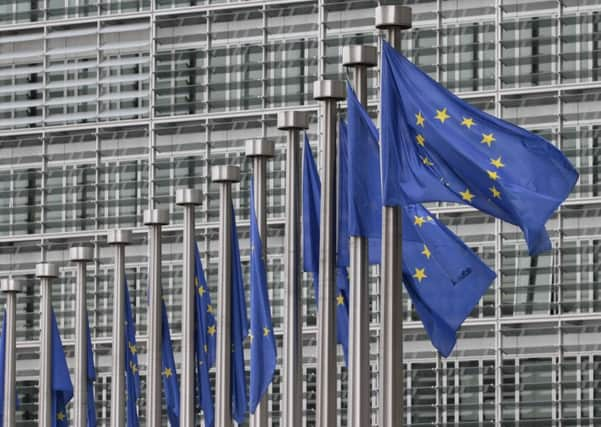Andrew Vine: Give us the facts so we can decide our future in Europe


The battle will be between heart and mind – an instinctive dislike of what can seem a meddlesome and power-crazed bureaucracy versus an anxiety over the economic consequences of going it alone.
And for all those who pause before voting “in” or “out”, there may be a moment’s reflection that a great deal of the campaigning to persuade them one way or the other has seemed like so much white noise, failing to deliver clear and credible arguments.
Advertisement
Hide AdAdvertisement
Hide AdThe debate over Britain’s continued membership of the EU has been one of the least inspiring of modern times.
There has been much sound and fury – a lot of table-thumping rhetoric, appeals to national pride or internationalist ambitions, but precious little in the way of hard facts.
Neither “pro” nor “anti” has so far landed a killer blow in the form of a powerful or convincing case, leaving large parts of the electorate genuinely perplexed as to what will be best for the country.
Voters know that whichever way they cast their ballot will have far-reaching consequences, but they simply do not know enough to be settled.
Advertisement
Hide AdAdvertisement
Hide AdThe latest campaign group to try to sway the result has its official launch tomorrow, and speaks to one of the most significant constituencies in Yorkshire – the Labour vote.
Labour Leave, driven by the party’s largest individual donor, businessman John Mills, and backed by one of the party’s most respected figures, former sports minister Kate Hoey, will argue for the so-called “Brexit” unless there is substantial EU reform.
Its views will be closely listened to in the Labour heartlands of our county, where, historically, there has been a strong streak of scepticism about the EU, and earlier the EEC.
That can be traced back to a suspicion amongst those communities who watched helplessly as the old heavy industries providing mass employment like coal, steel and engineering declined or even vanished, that British jobs had been lost to Europe.
Advertisement
Hide AdAdvertisement
Hide AdAdd to that a long-held resentment that as unemployment rose – and communities suffered as a result – successive leaders of Germany and France appeared to boss Britain about, and the prospect of Brexit will appeal to a lot of traditional Labour supporters in Yorkshire.
Yet, if the latest campaign group to enter the fray is to make more of an impression than any of the others, it needs to offer some solid evidence for its case.
The case for leaving the EU is, to many, intrinsically attractive because it offers the hope of a new start for Britain.
Just as in the referendum for Scottish independence when huge numbers of voters were attracted to the nationalist promise of a bright new future, so the vision of a Britain freed from the shackles of EU interference has wide appeal.
Advertisement
Hide AdAdvertisement
Hide AdIn comparison, the case for staying in has about it a slightly stale whiff, the prospect of more of the same, except with a few tweaks to the rules.
Despite his tough talking about how he’s going to get the best deal for Britain, David Cameron’s rhetoric has the subtext of a man trying not to let his party’s historic schism over Europe hobble his premiership, as it left his predecessor John Major a lame duck.
The electorate senses this, and it is a source of unease that a milestone decision to stay in is being urged at least in part on the basis of political expediency.
Solid answers to fundamental questions are what the electorate deserves, and we are not getting them.
Advertisement
Hide AdAdvertisement
Hide AdWhat would really happen if Brexit became a reality, and the country’s relationship with its largest trading partner changed?
Thousands of jobs in Yorkshire depend on trade with Europe, and as a consequence so does the ability of families to keep a roof over their heads and food on the table. No group in the “anti” camp has yet provided convincing evidence that those jobs would be safe. Conversely, nor have the “pro” campaigners demonstrated that they would be at risk.
This is not good enough. Less than a year ago, voters were presented with clearly defined policies by competing parties in the general election, and were able to make their choice.
Yet on a vote which will influence Britain’s future for generations, irrespective of which of the main parties holds power, we have no such clarity.
Advertisement
Hide AdAdvertisement
Hide AdAssurances and assertions are poor substitutes for facts and figures. Rarely, if ever, can the British people have been asked to take a decision armed with so little reliable information.
The electorate is entitled to demand proper answers as the referendum draws nearer, so that it can make its decision with both heart and mind.